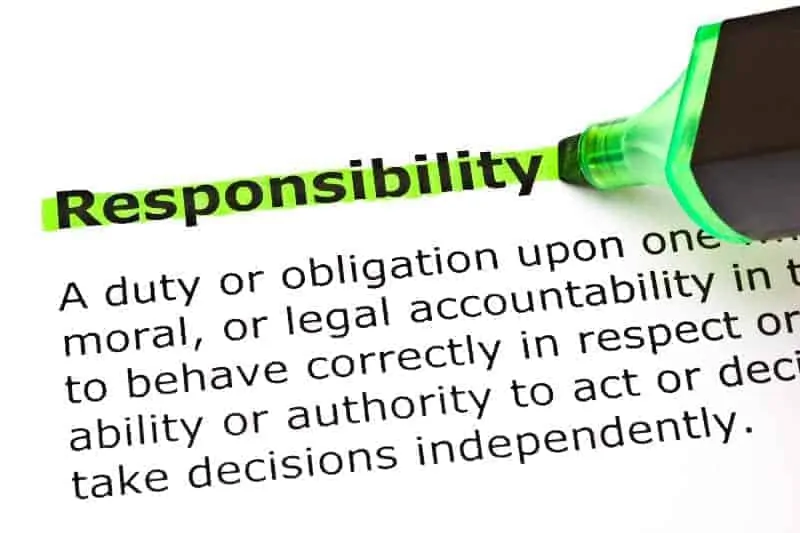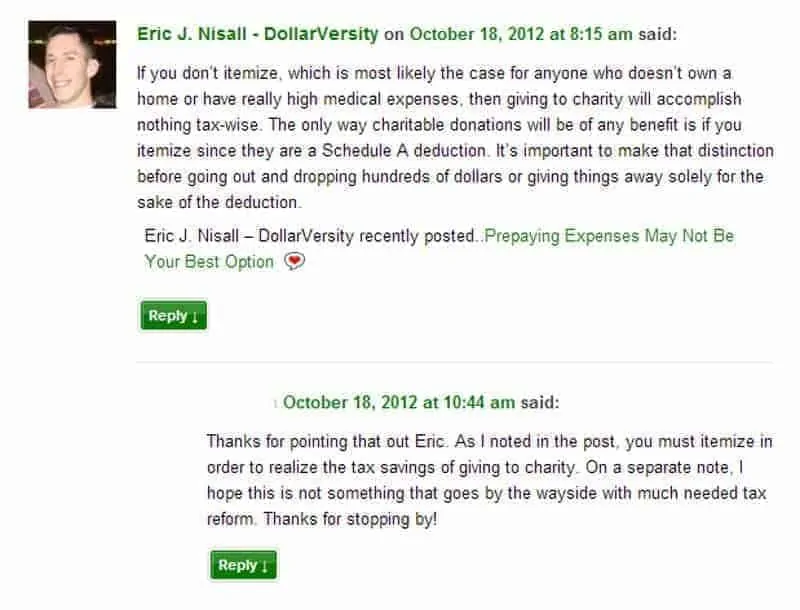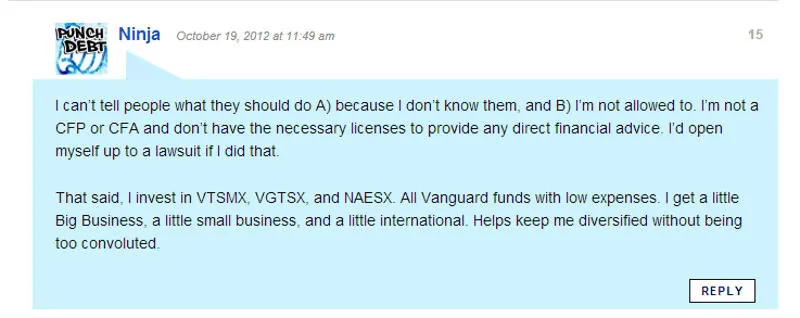All Bloggers Have A Responsibility To The Readers
This post may have affiliate links. Please read the Disclosure Policy for complete details.
People have trouble discerning what’s real these days.
Scripted yet considered “reality” television.
Alternative facts.
Fake news stories.
It seems that peoples’ definition of what’s real may vary.
Some people even think that anything they read on the internet is real because after all, they wouldn’t allow anything to be published that wasn’t, right?
Sadly, this is not always the case.
It even happens with bloggers and other online journalists.
You see, there is a lot of information that people publish that simply isn’t real.
Or at least not 100% complete and accurate.

We Have A Responsibility To Our Readers
We bloggers may be a relatively small community in the grand scheme of things, particularly those in the personal finance niche, like myself, and it may be frowned upon to call others out much in the same way whistleblowing is viewed as the adult version of “tattling”, but in this case, I feel it simply needs to be done.
You see, while staying at a Holiday Inn or playing a part on television may make it ok to step outside your knowledge base in commercials, it just isn’t right when it comes to giving advice online that others may depend on.
Too many times I have come across sites that give advice on how to save on taxes or giving tips for creating an investment strategy, or telling the readers that this or that type of insurance is not necessary.
In many instances, there is no disclaimer about talking to a licensed professional or someone who is truly qualified (and not in their own mind) to give advice on the subject matter.
Very seldom do people put a warning to this information stating that it is only their own opinion and not fact or advice.
Very rarely do people stop to think if they really should be writing on those topics in the first place.
I’m an accountant, so I only write about and give advice on things I deal with in my line of work.
I don’t write about investing in derivatives, or insurance, or even marketing a blog because, quite honestly, I don’t know a single thing about any of those topics and I have no business trying to talk about it from an authoritative standpoint.
Even if I’ve read a million blogs on any particular topic that doesn’t make me an expert or give me the right to try and come off as one.
Disclaimers Don’t Mean A Thing
There are a great many blogs out there with widgets or even entire pages that contain something to the effect of “…the information found on this site is for entertainment purposes only…”.
All that is, is a legal technicality that may help indemnify a person if they are accused of giving wrongful information at some point.
The fact of the matter is, regardless of what this disclaimer states (if you even have one, to begin with) many people write in a way that comes off as being authoritative and advisory in nature.
People don’t search out the disclaimer on websites or even read them after reading a blog post, they simply take the information at face value.
It may not be smart, but that’s the way it is.
Just having a disclaimer doesn’t make it alright to give advice or tell people what they should be doing in certain topic areas.
Why This Message? Why Now?
Not too long ago, Derek Halpern stated that we are facing a content credibility crisis and I believe it.
I have seen a major mainstream magazine publish an article that I found contained incomplete tax advice.
I also, during the course of my blog reading, came across a new blog (or at least was new to me, and one that I had never read before); the topic of the post that caught my attention was ways to save on taxes before the year ends.
Since that is both my educational and professional background, I was naturally curious.
That is when I saw this section about deducting money you donate to charity:

…which led to the following interaction:

This is where everything comes to light.
I don’t think I was very condescending or rude in the way I went about trying to correct the passage, but it really annoys me when people without the proper training or knowledge go off and write things that are either incomplete or entirely wrong (particularly when articles are based on something they had read/heard elsewhere without any real-world experience of their own on the topic).
The prior is the case in this exchange, as well as in the magazine article I mentioned before.
Here, the author is not providing clear and complete guidelines regarding the deductions for charitable contributions and clearly doesn’t understand my clarification in their response.
They even fail to understand that they actually did not make the distinction they claimed to have made in the response to my original comment.
These were two obvious examples of the type of content that fail to meet the responsibility we all have to our readers which I spoke of at the beginning of this article.
Too often, writers simply regurgitate information they have seen elsewhere, without truly understanding it or providing the proper context.
However, not everyone is guilty of this.
I recently came across a great response to a comment by Ninja at his blog Punch Debt In The Face.
There, he directly states that he cannot give more information due to the fact that he isn’t qualified or licensed to do so:

I instantly gained even more respect for the man and told him that I had become a fan for life when I read it.
It’s not something you see every day, especially in the blogosphere where so many people try to make themselves out to be experts in areas they aren’t rather than admitting the truth.
How hard is it to tell the truth?
It just takes seven words:
Sorry, I’m not qualified to answer that.
This Isn’t Just About Financial Bloggers
Anyone who writes for the purpose of informing others needs to be accountable for what they write and honor their responsibility to their readers.
Just because someone has been through a divorce, especially if they aren’t a divorce attorney, that doesn’t give them the right to try to give others advice on how to go through the process.
If someone successfully lost a lot of weight following a specific diet, that doesn’t mean they are qualified to give advice to others on how to go about it since they do not know the medical histories or circumstances surrounding other people’s weight issues.
If someone manages to follow the guidelines set by others to get good search rankings, that doesn’t mean that person is in a position to offer SEO consulting services.
It’s very simple: experience is only a small part of the authority equation in many instances.
It takes a lot more than going through something once or reading up on a subject to become an authority and be in a position to advise people on the matter(s).
Where Do We Go From Here?
I won’t pretend to have all of the answers, and that is actually the first step that needs to be taken.
People need to learn how to say “I don’t know” when asked about certain topics they do not fully understand or have a working knowledge of.
They need to be able to stop and say “I’m not in a position to talk about that” before they publish the same kind of information.
If you don’t know enough about a particular issue or topic, don’t write about it, it’s that simple.
What’s the saying?
Better to remain silent and be thought a fool than to speak out and remove all doubt.
We all need to remember that by trying to be “informative” we may actually become a point of reference for others to turn to, whether we like it or not.
We need to make it a point to remember that when putting things on a blog, magazine, ezine, newsletter, or whatever you publish because somebody may be trusting those words or ideas.
We all owe it to our readers to do right by them and give them complete, accurate information, especially if that is what the ultimate goal is.
Your Turn
Have you ever read something that left you shaking your head knowing it was factually incomplete or wrong? Have you ever wanted to tell a blog author or journalist that they really shouldn’t write about topics they clearly don’t have a strong understanding of? Go ahead, agree, or disagree with me, it’s ok either way.

You speak the truth, Eric. I think that in efforts to post consistently many bloggers fall into the trap of blogging about subjects they maybe don’t know much about simply to be able to write a post. I know I’ve fallen guilty to this as well before I really figured out what I wanted my “voice” to be as a blogger. I’d rather have people blog about their experiences with taxes and how it worked for them with a clear statement that this was simply their experience rather than pretend to be giving qualified advice.
BTW, are you a licensed blogging psychologist? Hahaha!
Please Travis, I have a hard time figuring myself out sometimes, let alone others lol.
Maybe I just put a lot of stock into my reputation, whether online or off, but I think it’s important to know what you are talking about or else the consequences can be much worse than the lack of credibility.
It’s funny, I could have gone on about the disclosures, but since I’m not a lawyer, I’d pretty much be talking out of my ass and anyone with any knowledge could have come here and tore me to shreds on it. I’d rather just stick to what I know and leave the rest for experts in those particular fields. So, if I lose a couple articles because of it, so be it. Better than looking like an idiot.
I think you’re making a big deal out of nothing. People know the web is full of crap and we use our head to weed through it. I’ve been taught that from middle school English class and it doesn’t take a genius to figure out that real professionals won’t give out their advice so freely on the web. Gotta seek them out.
I’m not so sure. These days there is so much information online and technology is so advanced that I feel many people are actually blindly trusting of a good deal of what they find. Plus, if someone publishes incorrect information, it’s still wrong regardless of anything else, which annoys the crap out of me. Besides, have you ever seen all of the “ask the readers” posts on the pf blogs or the “reader question” sections on the magazine sites? It seems like a lot of people are turning to those sources for guidance, perhaps as a way to save the cost of going to a true professional.
Please tell me you hate study results that aren’t open about their source/sample size too!
Don’t even get me started on surveys and studies. The 5-Hour Energy commercial claims 80-something percent of the 3,000 doctors surveyed would recommend a low-calorie energy supplement to their patients, but they never say if those doctors would recommend that particular product. Then you have the studies that break everything down into demographics that mean nothing like the one John @ My Family Finances wrote about–how different genders lie about the hours they work like it makes any difference in the world how that study turned out.
Take your tax return to ten accountants. Whats the likelihood you will get returns that are all the same?
Or doctors who prescribe in their own box and dont fully consider side effects with other treatments even when they are known.
You give pros too much credibility.
Nowhere did I say that all professionals will be perfect, but, who are you most likely to get the most accurate and beneficial advice from: the random guy on the internet who can’t even explain a simple deduction thoroughly or completely or a tax preparer with 10+ years of experiences filing over 100 returns a year? What about the blogger who reads health magazines and re-states the stuff they read but abridge it so as not to confuse readers or your internist? There are always going to be negative results if you try the same thing enough times, it’s a fact of life.
The point is that if someone can’t even get the information they are trying to relay to people correct, then perhaps that person shouldn’t be talking about it in the first place. It’s more about being responsible than anything else.
Besides, tax preparation is very subjective in certain areas and open to interpretation depending on the preferences and personalities of the preparer and taxpayer.
Good advice Eric. Thanks for calling me to think more critically about what I write.
I think we can all benefit from taking a good look at ourselves before posting any kind of content, Thad. I’m certainly not exempt from my own analysis and criticism, and end up scrapping plenty of articles after deciding that I shouldn’t be writing on certain issues.
Fair points. I try to shy away from topics like investing or taxes because I know so little about them. That said, I think it’s important to realize a distinction between opinion and advice. I try to avoid giving advice, both on my blog and offline.
You bring up an interesting point Edward. I’m sure a lot of people think what they are doing is giving an opinion, when in reality they are giving advice. It’s a fine line line that separates the two, and sometimes it’s difficult to tell the difference based on how people write.
I believe that a lot of bloggers hire unqualified staff writers or outsource to ghost writers from other country, causing these sort of mess. You did our community a good by pointing out the fact.
As for entertainment purposes, nobody wants to watch “the Husbands of Real Housewives.” As far as responsibility goes, readers need to question the source of their advice. Now, it’s time to check disclaimers.